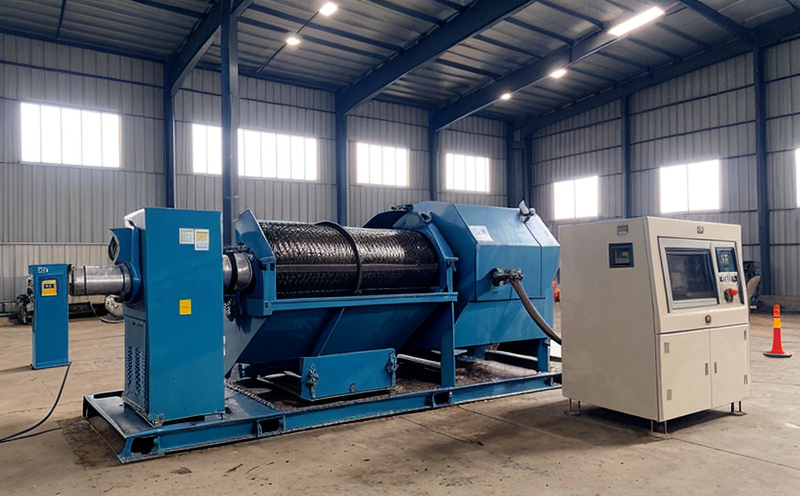Industrial shredder inspection
The process of industrial shredder inspection is critical in ensuring that machinery used across various sectors operates efficiently and safely. Industrial shredders are complex machines designed to reduce materials into smaller pieces, often for recycling or disposal purposes. Proper maintenance and regular inspections are essential to prevent downtime, reduce the risk of accidents, and extend the lifecycle of these machines.
For quality managers and compliance officers responsible for overseeing industrial processes, a thorough inspection involves multiple steps that ensure the shredder meets international standards such as ISO 13857 on safety around machinery. This includes checking for wear-and-tear in critical components like gears, bearings, and motors, ensuring proper lubrication levels, and verifying alignment of shafts.
From the perspective of R&D engineers involved in optimizing shredder performance, inspections provide valuable data points that can inform future design improvements. By closely monitoring operational parameters during routine checks, they can identify patterns indicative of potential failures or inefficiencies. Compliance officers play a crucial role here too by ensuring all procedures adhere to relevant regulatory frameworks.
For procurement professionals looking into purchasing new shredder equipment or upgrading existing fleets, understanding the inspection process helps make informed decisions about maintenance contracts and spare part availability. A well-maintained shredder not only saves costs associated with premature replacements but also ensures smooth integration into broader operational processes.
The benefits extend beyond just internal operations; compliant inspections enhance safety for workers handling heavy machinery while reducing environmental impacts by optimizing material reduction processes. In sectors like manufacturing, waste management, and recycling industries where industrial shredders are widely used, consistent inspection practices contribute significantly to sustainability goals.
Customer Impact and Satisfaction
The results of thorough industrial shredder inspections directly translate into enhanced customer satisfaction across multiple dimensions. Firstly, it leads to improved product quality by ensuring that the machinery is functioning optimally at all times. This means more consistent output rates without unexpected disruptions, which translates positively for end-users who rely on these machines.
From an operational standpoint, satisfied customers benefit from reduced downtime and lower maintenance costs due to proactive identification of issues during inspections. Compliance with international standards like ISO ensures that the services offered align perfectly with industry best practices, thereby building trust among clients.
In terms of environmental responsibility, satisfied customers appreciate knowing their business partners are committed to sustainability initiatives through regular maintenance schedules that minimize waste generation and energy consumption. For those in regulatory compliance roles, peace of mind comes from knowing that all aspects of the inspection process follow established guidelines which help avoid costly penalties or reputational damage.
Ultimately, satisfied customers feel reassured about long-term reliability and performance when partnering with a provider who prioritizes robust industrial shredder inspections. Such providers establish themselves as reliable partners capable of delivering consistent excellence across all aspects of service delivery.
International Acceptance and Recognition
The inspection of industrial shredders is recognized globally for its importance in ensuring that these machines operate safely and efficiently. Internationally accepted standards such as ISO 13857 provide a framework within which inspections are carried out, emphasizing the need to identify risks associated with machinery use.
Compliance with these standards is crucial not only because it ensures safety but also because it helps maintain industry reputation and credibility. Many organizations rely on third-party certifications from bodies like the American Society for Testing and Materials (ASTM) or European Norms (EN), which validate adherence to best practices.
Recognition by international authorities adds significant weight to inspection reports, making them more credible among stakeholders worldwide. This is particularly important given the increasingly global nature of business operations where seamless integration between different countries' regulatory requirements becomes essential.
In summary, the acceptance and recognition afforded to properly conducted industrial shredder inspections reflect a commitment to excellence in service delivery. By adhering strictly to recognized standards, providers can build strong relationships based on mutual trust and reliability, enhancing overall customer satisfaction.
Use Cases and Application Examples
| Application Example | Description |
|---|---|
| Recycling Industry | In the recycling sector, industrial shredders are used to process waste materials into smaller pieces for easier sorting and reprocessing. Regular inspections ensure that these machines operate efficiently, reducing downtime and enhancing overall productivity. |
| Mining Operations | Shredders play a vital role in breaking down large chunks of rock and ore into manageable sizes suitable for further processing. Proper inspection helps maintain optimal performance, minimizing maintenance costs and maximizing output. |
| Manufacturing Plants | In manufacturing environments, industrial shredders are used to handle a variety of materials from plastics to metals. Regular inspections help in maintaining consistent quality control while ensuring compliance with safety regulations. |
| Construction Sites | On construction sites, shredded waste products like concrete and steel can be reused effectively after proper treatment. Inspections here focus on the machine’s ability to handle tough materials safely and efficiently. |
| Environmental Protection Agencies | Government agencies use industrial shredders for managing hazardous waste. Inspection ensures that these machines comply with strict environmental protection laws, thus safeguarding public health. |





